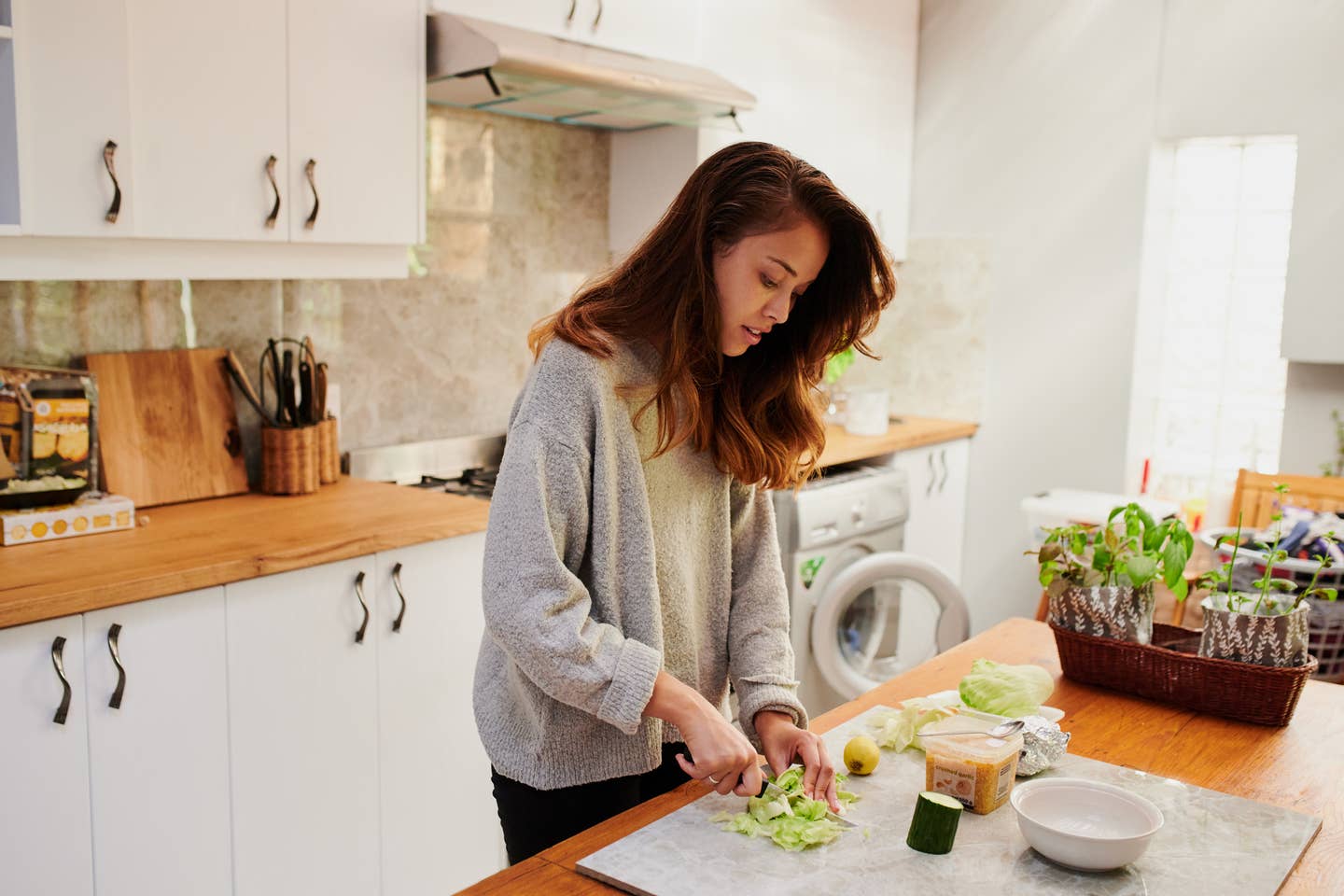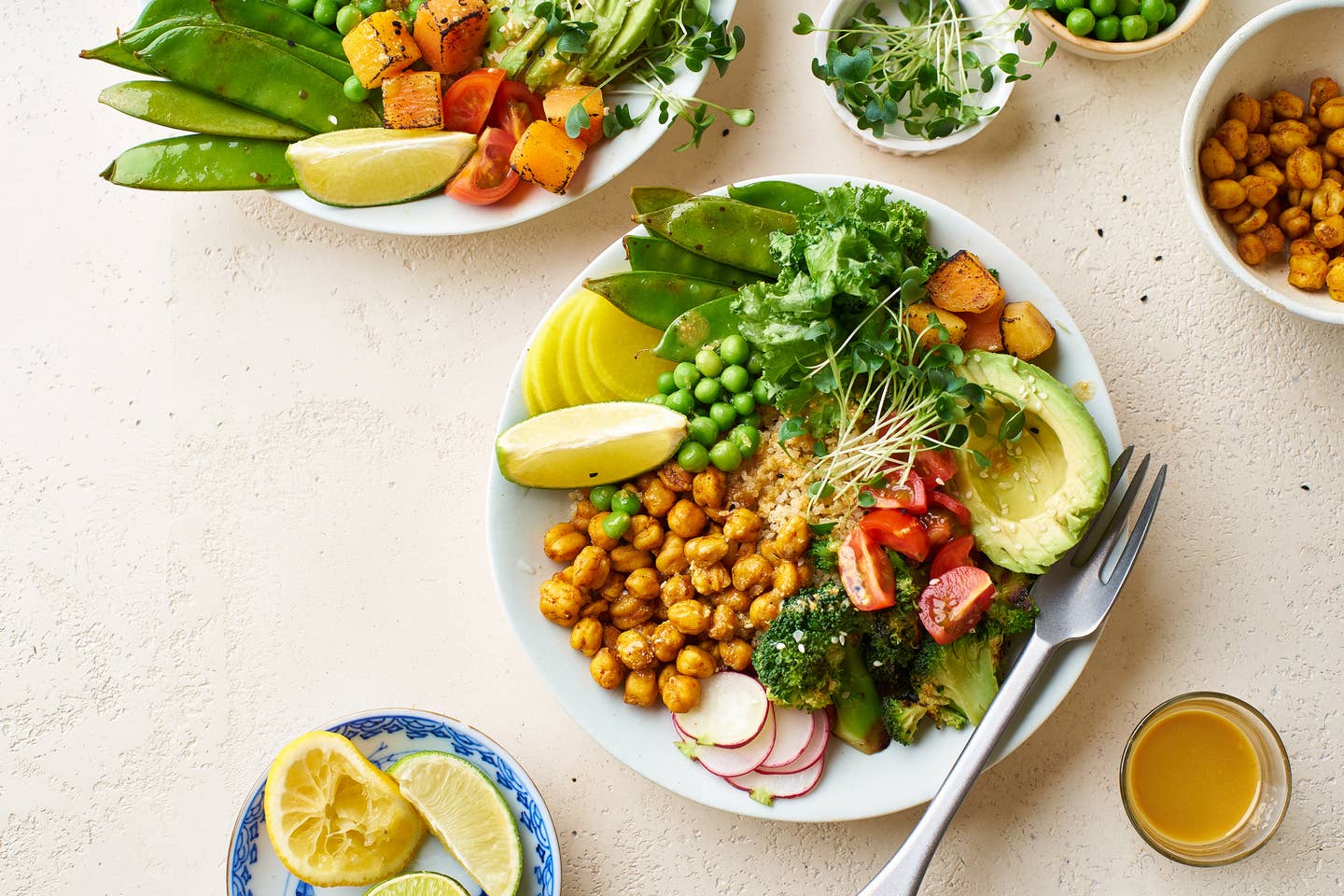
How to Start Eating a Whole-Food, Plant-Based Diet, From Nicole Osinga, RD
If you are interested in learning how to start eating a whole-food plant-based diet, as I am, then it helps to start by asking an expert what you can and can not eat since this specific type of diet is known to be healthy, prevent disease and help people lose weight if that is the goal.
I wanted to try a whole food plant-based approach for a week,d but as much as I know about plant-based foods from both my education and reporting on the subject—and being a long-time vegan myself— when I decided to eat strictly whole-food plant-based (WFPB) for a week, I found myself confused about what was acceptable to eat and what was off-limits. So as any good journalist does, I enlisted the help of an expert. I went live on IGTV to interview Nicole Osinga RD, a plant-based Registered Dietitian, and Certified Diabetes Educator to set the record straight on WFPB.
Osinga shared exactly how to start eating a whole-food plant-based diet, and what’s actually included in a WFPB diet, including valuable information about how it’s different from a vegan diet or plant-based approach, which can include items that are free of animal products but not technically "whole" foods. Osinga also extolled the many health benefits of trying to eat more whole plant-based foods, and which exact foods to focus on incorporating into your diet. We even took a tour through my fridge and pantry, so I could get clarity on commonly confused WFPB-acceptable items like chocolate, bread, wine, popcorn, and more.
Anna Keeve: So Nicole, you’re a plant-based registered dietician based in Canada, and you’re also a certified diabetes educator. You’re a contributor to The Beet, and you also helped to create the VegStart Diet, which is amazing. So, welcome!
Nicole Osinga: Thank you!
AK: I invited anyone who is watching to chime in with your questions. I also have questions that have been at the front of my mind. I think the best way to start is to just ask: What is whole food plant-based? When someone eats that way, either for lifestyle or for diet, what does that mean?
NO: It means eating foods that are closest to their natural form as possible, or with minimal processing.
There isn’t one solid definition for what diets are whole food plant-based and which are not, but I think that returning to that generalization is key. The processing should just be to preserve and increase the healthfulness of the food.
AK: That makes sense. Good! And as to why –– why do people go whole food plant-based?
NO: There’s been a lot of research telling us about the benefits in terms of certain conditions. So, for example, there’s research showing that eating a plant-based diet can decrease the risk of certain kinds of cancers. It’s also great for reducing the risk of cardiovascular disease, diabetes, hypertension, and anything that we associate with heart disease. Oftentimes, people just have a lower BMI (body mass index) and they follow the diet for weight loss if that person feels like it’s a sustainable way of eating. So, there are definitely so many benefits, Anna, to a whole food plant-based diet.
AK: That’s great! I feel like I often hear from people when I talk about being plant-based, “Oh, no oil!” And as we know, oil is in so many things, especially when we talk about packaged plant-based products. So, why is eliminating oil such a focus?
NO: It’s a tough one. To be honest, my focus is looking at the type of oil, but technically oil is processed food. You can still get really good olive oils. If you ask me, fats are great, and we have to ask: Is it practical to eliminate oils forever, even in some of our sauces? Oil sneaks into someone's type of food. So I think that the best message is adding good fats –– avocados, chia seeds –– over oils.
AK: Right. I see someone asked about dairy. So, vegan already says no animal products whatsoever, and whole-food you could say takes it one step further.
Would you agree that it’s a bit stricter, a bit more restrictive?
NO: Yes, exactly.
AK: One thing that I was curious about was protein and fiber sources. If you could recommend some of the best protein and fiber sources that I could incorporate into this journey?
NO: So in terms of proteins, any type of legumes is going to be a good idea. Lentils, black beans, white beans –– there are so many things you can do with those items, through them into a falafel, put them in salads, chili, etc. The options really are endless. Going back to that general definition of whole food plant-based, foods like tofu and tempeh are great sources. They’re technically a little bit processed, but the purpose is to increase the healthfulness, there’s not necessarily a bunch of added ingredients, so I would certainly take advantage of those.
AK: Okay, excellent. And then, let’s talk about meals that you would recommend. There are some resources out there that I’m going to use. For example, our friends over at Forks Over Knives have great resource guides, The Beet has recipe articles, smoothies. But what about you?
What are some top-level meals, maybe even on the easier side? And what are your tips for meal prep?
NO: I can definitely help with that one. So, in terms of meals, let’s go through a sample day. For breakfast, oatmeal is my go-to. I’m always doing overnight oats, you could do a baked oatmeal dish. You could also do a tofu scramble for breakfast. For lunches, I recently made a barley lentil apple salad, and it’s actually a really great combination. There’s some spinach in there, some onion, and you’ll feel so full after that because it has lots of fiber and lots of protein. For dinner, maybe you can do a tempeh stir-fry with quinoa, or maybe we could do a chili or a soup. And for snack time, you can combine chia pudding with nuts or fruit. I like to prep all my meals in advance, so on the weekend I plan for four days, but when it comes to snacks, I just want simple grab-and-go’s.
AK: Good, that sounds like a great mix of nutrient-dense and fiber protein, and you can certainly get all of that with plant-based food. I’m notoriously a big snacker, and I tend to grab for a chip or a puff, they taste so good! So, I’m going to take your advice on some of those other snacks to have on hand.
NO: Yes! Just stock your kitchen with these things, to make sure you have access to healthy food. Chips are super accessible, you open up a bag and there they are, ready to eat! But if you can prepare, you’ll be fine.
AK: Good! I also thought we could do a bit of yes-or-no because as much as I think I know about plant-based eating, I was going through my fridge in preparation for this week, and I was thinking, “Wait, is this allow? Is this allowed?” So I’m going to go through some products rapid-fire to show you, and you can tell me what you think.
NO: Let’s do it!
AK: So first, I've started doing smoothies a lot recently. I used Planet Protein Inc. protein powder, from an eco-friendly products guide we did recently. It’s a plant protein, but it has a ton of other ingredients in it, so, would you say this is allowed?
NO: I’m going to have to say no, unfortunately. However, let’s discuss alternatives to each one that I turn down. For this, hemp seeds would be wonderful to add to your smoothies. I recently added some chickpeas into smoothies –– kind of a random combo, but it’s actually not bad.
AK: Chickpeas! That’s interesting. Okay, another one. This one is going to be hard to live without. I love bread, especially sourdough bread and bagels. These here are cinnamon raisin bagels from Trader Joe’s –– what about bread?
NO: I think it goes back to that fine line between what’s processed and what’s ultra-processed. If you were, say, talking about a pasta that’s made from chickpeas––
AK: That was one of my items!
NO: Yes! I love that stuff, the Banza pasta is fantastic. Depending on the one you have, there might just be one or two ingredients in the pasta, but with the bagels, it’s going to go up to that next level of added ingredients. So I would say no to the bagels, but absolutely yes to the chickpea pasta because it’s minimally processed.
AK: Right! Someone just asked about Dave’s bread and Ezekiel sprouted bread. What about those two?
NO: Those would be better choices because we want to stick to as few ingredients as possible. They only use a few different ingredients.
AK: Someone also asked about cashew cheese.
NO: I would say make your own. You just soak the cashews, blend it up with a few different spices, and use that. I would steer away from the processed vegan cheeses as much as possible.
AK: Right, I know that a lot of the vegan cheeses have oil. I’ve never made my own cashew sauce or anything like that, but I’ll have to try it this week! Okay, another one that somebody asked me about is peanut butter. There’s no oil, so I assume this is okay?
NO: Yes, that’s okay. Oil is part of a lot of foods that are good for your health, so naturally processed peanut butter is totally fine.
AK: Definitely. That’s definitely one of my go-to’s. Someone else mentioned beet chips. I guess you could make your own beet chips, right?
NO: Yes, I’ve done that, actually, in the air fryer. I’ve done lots of root veggies. I wouldn’t buy the already-made veggie chips, because oftentimes those are just way too processed, and they’re a little bit tricky with the ingredients. It can be similar to a regular chip, not giving you the benefit of that vegetables.
AK: Well that you so much for all the help. I’m so excited to get started on this journey!
More From The Beet






